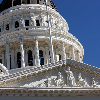New Juneteenth Federal Holiday's Effect on California School Calendars

June 2021
Number 11
On June 17, 2021, President Joe Biden signed legislation known as the “Juneteenth National Independence Day Act,” which amends Title 5 of the United States Code, Section 6103 (“Section 6103”), designating June 19 as a new “legal public holiday” to be known as Juneteenth National Independence Day.
California school districts have asked whether the new federal holiday requires California schools to close on each June 19, and, if so, whether school districts will be required to provide holiday pay to classified employees who work on the holiday.
The creation of this new federal holiday does not, at this time, require that California school districts close schools. Education Code section 37220, governing the school calendar and addressing holidays, specifically states that public schools are to close on, all days “appointed by the President as a public fast, thanksgiving, or holiday, unless it is a special or limited holiday.” (See also, Ed. Code, §§ 45203, 79020, and 88203.) While the President signed the legislation, this action does not create a holiday that was “appointed” or “declared” by the President. A similar comparison is that, while Columbus Day is also a federal holiday under Section 6103, it is not a required holiday for California school districts. In addition, in order for a national holiday to be declared, it must be “apparent in the language of the proclamation, executive order, or other official announcement itself” that there was intent to designate the day as a national holiday. (CSEA v. Governing Board of the Marin Community College District (1994) 8 Cal.4th 333, 343.)
In determining the school district’s approach, each school district should review its collective bargaining agreement in order to fully analyze the district’s individual approach to creating new holidays.
As this federal legislation is newly signed, it is possible that there could be future legislation or action by the President, the California Legislature or Governor that could change the requirement for school districts.
As school districts explore options, they may want to contact legal counsel to further discuss and analyze the pros and cons of any approach. Please contact an attorney at one of our eight offices located statewide. You can also subscribe to our podcast, follow us on Facebook, Twitter and LinkedIn or download our mobile app.
Number 11
On June 17, 2021, President Joe Biden signed legislation known as the “Juneteenth National Independence Day Act,” which amends Title 5 of the United States Code, Section 6103 (“Section 6103”), designating June 19 as a new “legal public holiday” to be known as Juneteenth National Independence Day.
California school districts have asked whether the new federal holiday requires California schools to close on each June 19, and, if so, whether school districts will be required to provide holiday pay to classified employees who work on the holiday.
The creation of this new federal holiday does not, at this time, require that California school districts close schools. Education Code section 37220, governing the school calendar and addressing holidays, specifically states that public schools are to close on, all days “appointed by the President as a public fast, thanksgiving, or holiday, unless it is a special or limited holiday.” (See also, Ed. Code, §§ 45203, 79020, and 88203.) While the President signed the legislation, this action does not create a holiday that was “appointed” or “declared” by the President. A similar comparison is that, while Columbus Day is also a federal holiday under Section 6103, it is not a required holiday for California school districts. In addition, in order for a national holiday to be declared, it must be “apparent in the language of the proclamation, executive order, or other official announcement itself” that there was intent to designate the day as a national holiday. (CSEA v. Governing Board of the Marin Community College District (1994) 8 Cal.4th 333, 343.)
In determining the school district’s approach, each school district should review its collective bargaining agreement in order to fully analyze the district’s individual approach to creating new holidays.
As this federal legislation is newly signed, it is possible that there could be future legislation or action by the President, the California Legislature or Governor that could change the requirement for school districts.
As school districts explore options, they may want to contact legal counsel to further discuss and analyze the pros and cons of any approach. Please contact an attorney at one of our eight offices located statewide. You can also subscribe to our podcast, follow us on Facebook, Twitter and LinkedIn or download our mobile app.
As the information contained herein is necessarily general, its application to a particular set of facts and circumstances may vary. For this reason, this News Brief does not constitute legal advice. We recommend that you consult with your counsel prior to acting on the information contained herein.






